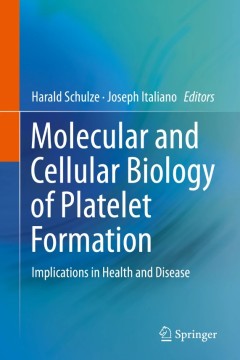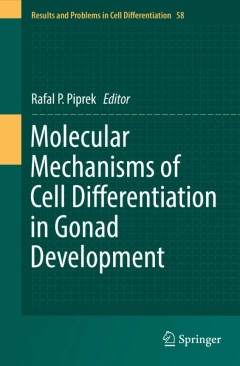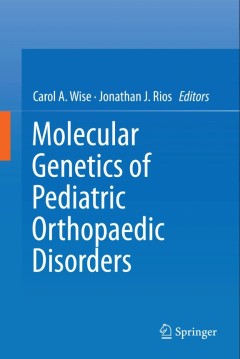Filter by

Emerging and Evolving Topics in Multiple Sclerosis Pathogenesis and Treatments
Over the past decade, we have made great advances in the field of multiple sclerosis (MS) research, and this book focuses on those advances in MS pathogenesis and treatment. While some of these advances have been through new approaches and ideas that have emerged in the last decade such as the newly identified protective role that amyloid proteins may play in MS or the use of helminths to treat…
- Edition
- -
- ISBN/ISSN
- 978-3-319-25543-9
- Collation
- XII, 235
- Series Title
- -
- Call Number
- -

Molecular and Cellular Biology of Platelet Formation
This book gives a comprehensive insight into platelet biogenesis, platelet signal transduction, involvement of platelets in disease, the use of diverse animal models for platelet research and future perspectives in regard to platelet production and gene therapy. Being written by international experts, the book is a concise state-of-the art work in the field of platelet biogenesis, biology and r…
- Edition
- 1
- ISBN/ISSN
- 978-3-319-39560-9
- Collation
- X, 460
- Series Title
- -
- Call Number
- -

Movement Disorder Genetics
This book covers recent developments and possible pitfalls in the diagnosis of genetic movement disorders and related conditions. It is divided into three sections: technical and scientific aspects; clinical aspects with guidance towards work-up; and ethical and legal aspects of genetic testing in a clinical and research setting. The first section includes chapters on genetic analysis and co…
- Edition
- 1
- ISBN/ISSN
- 978-3-319-17222-4
- Collation
- XIV, 530
- Series Title
- -
- Call Number
- -

The Tomato Genome
This book describes the strategy used for sequencing, assembling and annotating the tomato genome and presents the main characteristics of this sequence with a special focus on repeated sequences and the ancestral polyploidy events. It also includes the chloroplast and mitochondrial genomes. Tomato (Solanum lycopersicum) is a major crop plant as well as a model for fruit development, and the av…
- Edition
- -
- ISBN/ISSN
- 978-3-662-53389-5
- Collation
- -
- Series Title
- -
- Call Number
- -

Modified Nucleic Acids in Biology and Medicine
This volume is comprised of 18 chapters, covering various aspects of DNA modification and RNA modified bases. It also discusses in detail circular RNA, therapeutic oligonucleotides and their different properties. The chemical nature of DNA, RNA, protein and lipids makes these macromolecules easily modifiable, but they are also susceptible to damage from both endogenous and exogenous agents. …
- Edition
- 1
- ISBN/ISSN
- 2197-9758
- Collation
- XIV, 453
- Series Title
- RNA Technologies
- Call Number
- -

Molecular Pathology in Cancer Research
Cancer Biology, Medical Genetics, Cell Biology, Protein Biochemistry, Molecular Genetics
- Edition
- 1
- ISBN/ISSN
- 978-1-4939-6641-7
- Collation
- VIII, 369
- Series Title
- -
- Call Number
- -

Molecular Mechanisms of Cell Differentiation in Gonad Development
This book presents the current state of knowledge on the origin and differentiation of cell lines involved in the development of the vertebrate male and female gonads with particular emphasis on the mouse. It also discusses the processes leading to the testis- and ovary-specific structures and functions. The individual chapters review the origin and differentiation of the somatic cells of th…
- Edition
- 1
- ISBN/ISSN
- 978-3-319-31971-1
- Collation
- XII, 434
- Series Title
- Results and Problems in Cell Differentiation
- Call Number
- -

Molecular Genetics of Pediatric Orthopaedic Disorders
In the past two decades we have seen a surge forward in understanding the genetics and biochemistry underlying many pediatric orthopaedic disorders. A few projects have even progressed into the realm of clinical trials that are primarily aimed at controlling progressive disease. Meanwhile, genomic technology development has outpaced expectations and is enabling gene discovery for disorders that…
- Edition
- 1
- ISBN/ISSN
- 978-1-4939-2168-3
- Collation
- XII, 168
- Series Title
- Springer New York, NY
- Call Number
- -

Molecular Breeding of Forage and Turf
This proceeding covers all the collected research data and presentations from the 8th International Symposium on the Molecular Breeding of Forage and Turf. The book explores themes in molecular breeding of forage and turf, including abiotic and biotic stresses, bioenergy and biorenewables, comparative genomics, emerging tools for forage and turf research, functional genetics and genomics and ge…
- Edition
- 1
- ISBN/ISSN
- 978-3-319-08713-9
- Collation
- XIII, 194
- Series Title
- -
- Call Number
- -

The Sorghum Genome
This book provides insights into the current state of sorghum genomics. It particularly focuses on the tools and strategies employed in genome sequencing and analysis, public and private genomic resources and how all this information is leading to direct outcomes for plant breeders. The advent of affordable whole genome sequencing in combination with existing cereal functional genomics data has…
- Edition
- -
- ISBN/ISSN
- 978-3-319-47789-3
- Collation
- -
- Series Title
- -
- Call Number
- -
 Computer Science, Information & General Works
Computer Science, Information & General Works  Philosophy & Psychology
Philosophy & Psychology  Religion
Religion  Social Sciences
Social Sciences  Language
Language  Pure Science
Pure Science  Applied Sciences
Applied Sciences  Art & Recreation
Art & Recreation  Literature
Literature  History & Geography
History & Geography